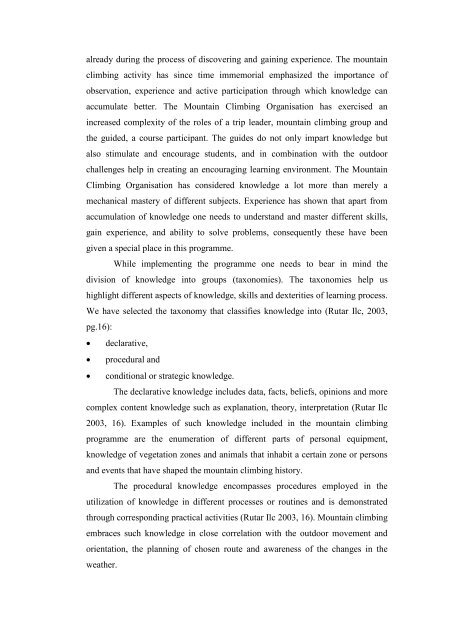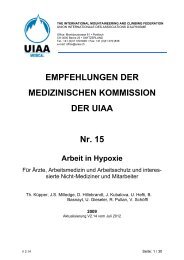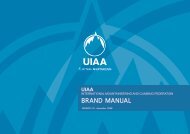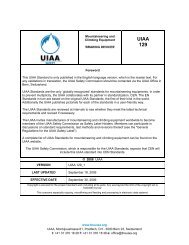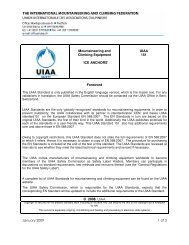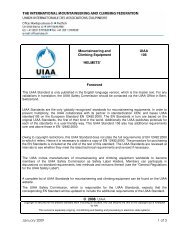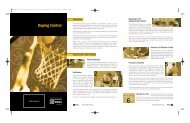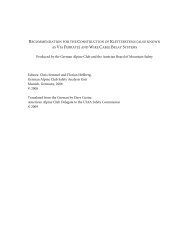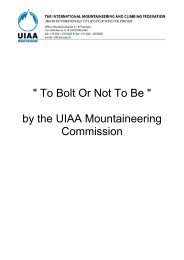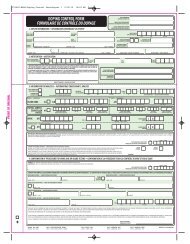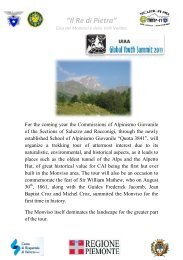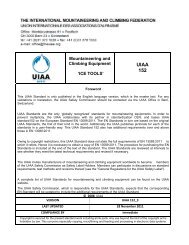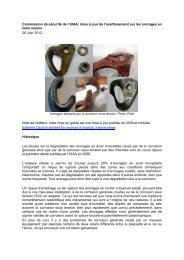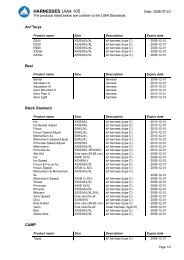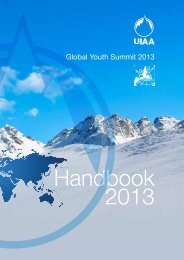AGE-ADJUSTED PROGRAMME OF MOU TAI CLIMBI G ... - UIAA
AGE-ADJUSTED PROGRAMME OF MOU TAI CLIMBI G ... - UIAA
AGE-ADJUSTED PROGRAMME OF MOU TAI CLIMBI G ... - UIAA
Create successful ePaper yourself
Turn your PDF publications into a flip-book with our unique Google optimized e-Paper software.
already during the process of discovering and gaining experience. The mountain<br />
climbing activity has since time immemorial emphasized the importance of<br />
observation, experience and active participation through which knowledge can<br />
accumulate better. The Mountain Climbing Organisation has exercised an<br />
increased complexity of the roles of a trip leader, mountain climbing group and<br />
the guided, a course participant. The guides do not only impart knowledge but<br />
also stimulate and encourage students, and in combination with the outdoor<br />
challenges help in creating an encouraging learning environment. The Mountain<br />
Climbing Organisation has considered knowledge a lot more than merely a<br />
mechanical mastery of different subjects. Experience has shown that apart from<br />
accumulation of knowledge one needs to understand and master different skills,<br />
gain experience, and ability to solve problems, consequently these have been<br />
given a special place in this programme.<br />
While implementing the programme one needs to bear in mind the<br />
division of knowledge into groups (taxonomies). The taxonomies help us<br />
highlight different aspects of knowledge, skills and dexterities of learning process.<br />
We have selected the taxonomy that classifies knowledge into (Rutar Ilc, 2003,<br />
pg.16):<br />
• declarative,<br />
• procedural and<br />
• conditional or strategic knowledge.<br />
The declarative knowledge includes data, facts, beliefs, opinions and more<br />
complex content knowledge such as explanation, theory, interpretation (Rutar Ilc<br />
2003, 16). Examples of such knowledge included in the mountain climbing<br />
programme are the enumeration of different parts of personal equipment,<br />
knowledge of vegetation zones and animals that inhabit a certain zone or persons<br />
and events that have shaped the mountain climbing history.<br />
The procedural knowledge encompasses procedures employed in the<br />
utilization of knowledge in different processes or routines and is demonstrated<br />
through corresponding practical activities (Rutar Ilc 2003, 16). Mountain climbing<br />
embraces such knowledge in close correlation with the outdoor movement and<br />
orientation, the planning of chosen route and awareness of the changes in the<br />
weather.


